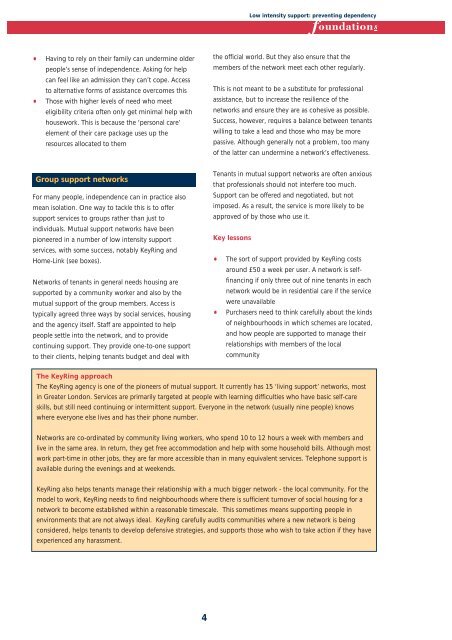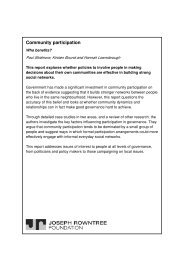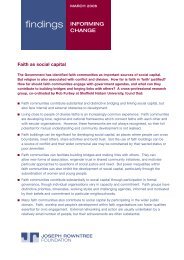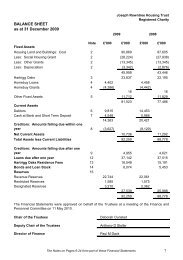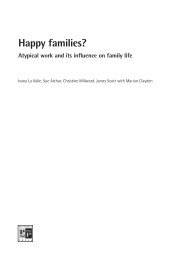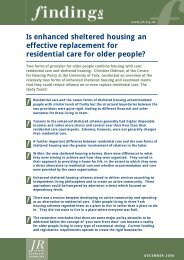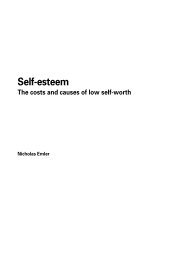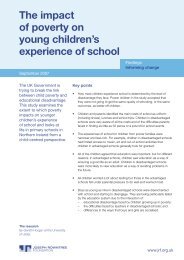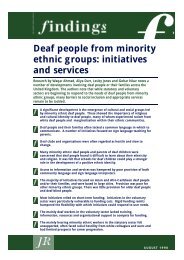Low intensity support - Joseph Rowntree Foundation
Low intensity support - Joseph Rowntree Foundation
Low intensity support - Joseph Rowntree Foundation
Create successful ePaper yourself
Turn your PDF publications into a flip-book with our unique Google optimized e-Paper software.
<strong>Low</strong> <strong>intensity</strong> <strong>support</strong>: preventing dependency<br />
• Having to rely on their family can undermine older<br />
people’s sense of independence. Asking for help<br />
can feel like an admission they can’t cope. Access<br />
to alternative forms of assistance overcomes this<br />
• Those with higher levels of need who meet<br />
eligibility criteria often only get minimal help with<br />
housework. This is because the ‘personal care’<br />
element of their care package uses up the<br />
resources allocated to them<br />
the official world. But they also ensure that the<br />
members of the network meet each other regularly.<br />
This is not meant to be a substitute for professional<br />
assistance, but to increase the resilience of the<br />
networks and ensure they are as cohesive as possible.<br />
Success, however, requires a balance between tenants<br />
willing to take a lead and those who may be more<br />
passive. Although generally not a problem, too many<br />
of the latter can undermine a network’s effectiveness.<br />
Group <strong>support</strong> networks<br />
For many people, independence can in practice also<br />
mean isolation. One way to tackle this is to offer<br />
<strong>support</strong> services to groups rather than just to<br />
individuals. Mutual <strong>support</strong> networks have been<br />
pioneered in a number of low <strong>intensity</strong> <strong>support</strong><br />
services, with some success, notably KeyRing and<br />
Home-Link (see boxes).<br />
Networks of tenants in general needs housing are<br />
<strong>support</strong>ed by a community worker and also by the<br />
mutual <strong>support</strong> of the group members. Access is<br />
typically agreed three ways by social services, housing<br />
and the agency itself. Staff are appointed to help<br />
people settle into the network, and to provide<br />
continuing <strong>support</strong>. They provide one-to-one <strong>support</strong><br />
to their clients, helping tenants budget and deal with<br />
Tenants in mutual <strong>support</strong> networks are often anxious<br />
that professionals should not interfere too much.<br />
Support can be offered and negotiated, but not<br />
imposed. As a result, the service is more likely to be<br />
approved of by those who use it.<br />
Key lessons<br />
• The sort of <strong>support</strong> provided by KeyRing costs<br />
around £50 a week per user. A network is selffinancing<br />
if only three out of nine tenants in each<br />
network would be in residential care if the service<br />
were unavailable<br />
• Purchasers need to think carefully about the kinds<br />
of neighbourhoods in which schemes are located,<br />
and how people are <strong>support</strong>ed to manage their<br />
relationships with members of the local<br />
community<br />
The KeyRing approach<br />
The KeyRing agency is one of the pioneers of mutual <strong>support</strong>. It currently has 15 ‘living <strong>support</strong>’ networks, most<br />
in Greater London. Services are primarily targeted at people with learning difficulties who have basic self-care<br />
skills, but still need continuing or intermittent <strong>support</strong>. Everyone in the network (usually nine people) knows<br />
where everyone else lives and has their phone number.<br />
Networks are co-ordinated by community living workers, who spend 10 to 12 hours a week with members and<br />
live in the same area. In return, they get free accommodation and help with some household bills. Although most<br />
work part-time in other jobs, they are far more accessible than in many equivalent services. Telephone <strong>support</strong> is<br />
available during the evenings and at weekends.<br />
KeyRing also helps tenants manage their relationship with a much bigger network - the local community. For the<br />
model to work, KeyRing needs to find neighbourhoods where there is sufficient turnover of social housing for a<br />
network to become established within a reasonable timescale. This sometimes means <strong>support</strong>ing people in<br />
environments that are not always ideal. KeyRing carefully audits communities where a new network is being<br />
considered, helps tenants to develop defensive strategies, and <strong>support</strong>s those who wish to take action if they have<br />
experienced any harassment.<br />
4


